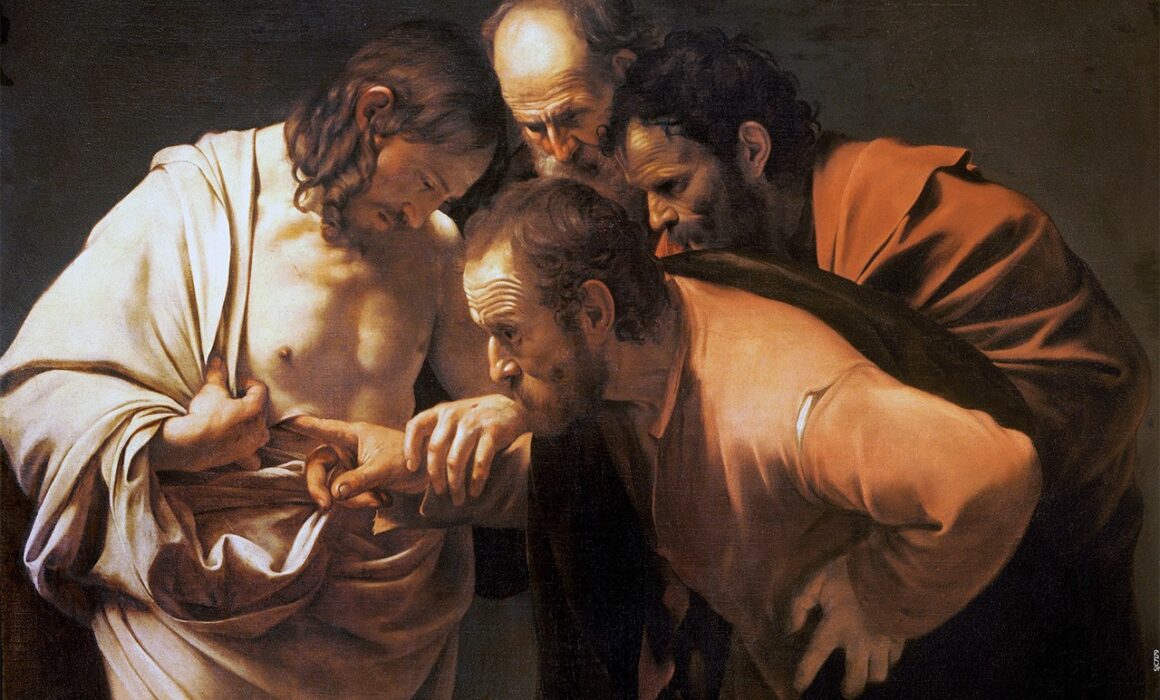Sermon for the Second Sunday of Easter
“Eight days later, his disciples were inside again, and Thomas was with them.”
+INJ+
‘That which was from the beginning, which we have heard, which we have seen with our eyes, which we looked upon and have touched with our hands, concerning the word of life— the life was made manifest, and we have seen it, and testify to it and proclaim to you the eternal life, which was with the Father and was made manifest to us.’
When we speak of God, we often speak in abstractions. We speak of things that we feel, that we intuit; that we felt that God was speaking to us in a moment, that He was reaching out to us at a time, that He was guiding us through some trial. This is how we speak of the Almighty, because we do not think that God can be seen, He can only be perceived by some sense.
The Apostles would have none of this. There was nothing theoretical about God. For them, God was a person whom they had seen with their eyes and touched with their hands; who had healed the sick and the blind; who had raised the dead, and been raised from the dead. They had witnessed these things, and for bearing this witness, they would be called martyrs, for they would carry this witness to their graves; the witness of the Christ crucified, who would raise all on the last day from the grave.
They had no fear of death, for they had seen death defeated, and knew that death was but a passing spell. The Lord said ‘peace be with you.’ And for this reason they faced the sword and the lion and the cross.
This is why it is said that the Christian mocks death, for it is as if he were to say to the murderer ‘you cannot kill me, I live forever in Christ, and though you slay my body, yet I shall live in God, who shall comfort me in this moment, and raise all flesh on the last day, that I may dwell in His glory forever.’ This is our final consolation.
This day, St. Thomas, whom we call ‘doubting,’ swears that he will not believe in the resurrection of the Lord unless he himself sees the wounds and piercings of Jesus.
He has done nothing wrong. He only desires to be counted among the martyrs, as one who saw, and bore witness, and died for the sake of the truth he saw, and touched, and knew; just as the other disciples, whom Jesus had shown his hands and his side. And indeed he will die for the sake of Christ, by the edge of a spear, even as the Lord was pierced upon the wood of the tree.
We mock this disciple for wanting to see. Blessed is he who desires to see God, and give up his life. Who are we to judge, who desire neither to see, nor to die, but to live in comfort until the end of our days? Cast not the stone, O ye of little faith.
For Thomas was not faithless; rather, he believed in the resurrection of the dead, and would not trust in a resurrection that was merely of spirit or soul or metaphor. He needed to see the real thing; Christ in the flesh.
Knowing this, our Lord in His compassion appears before the disciples. He comes before St. Thomas, and begs him, ‘Put your finger here, and see my hands; and put out your hand, and place it in my side. Do not disbelieve, but believe.’ Which is to say, ‘see that I am risen, even in the flesh, in the very flesh that was crucified and buried for you, for your sin, and for the world, and raised from the grave for your glory, and the glory of all the children of Adam.’
The disciple Thomas is said to have gone from unbelief to belief. We take this to mean that he went from faithlessness to faith, for such a turn, or its reverse, we are much acquainted with.
Yet it is more likely that he went from disbelief in what was too good to be true to belief in what all humanity has always longed to be true. He has touched the blood of Christ, those sacred injuries; ‘That which was from the beginning, which we have heard, which we have seen with our eyes, which we looked upon and have touched with our hands’
The entire history of the suffering of man, his tortures and wounds and hatreds and longings; everything has been justified by the goodness of God, for St. Thomas has touched the blood of the hand of Christ; Him who has abolished death.
It is no wonder that the disciple cries out, ‘My Lord and my God.’ Would you not also, if you saw that every sickness of your soul and every wound in your mind; every fear of your heart and weakness of your body had been conquered; even conquered by the rising of the Son of Man?
Now we approach the altar, that we may see the risen Lord, this body and this blood, that which was from the beginning. Do not merely observe, and touch, but taste, and see that the Lord is good; see that life has overcome death, and that the fear of death has been abolished; that all good things have been given to you.
Taste of the Lord, you doubting mind, the fulfillment of all creation, and:
‘Do not disbelieve, but believe.’
+INJ+
Preached by Pastor Fields
Sermon Texts: Acts 4:32-35; 1 John 1:1-2:2; John 20:19-31.



